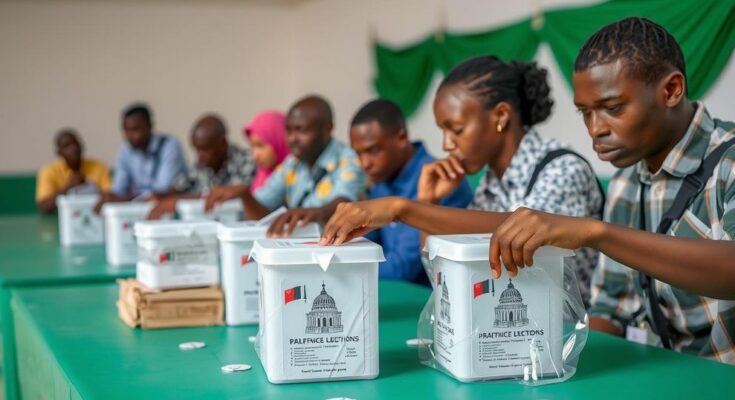Voters in Comoros are electing members for the 33-seat parliament amidst allegations of electoral misconduct surrounding last year’s presidential election. Approximately 338,000 individuals are registered to vote, with nearly 100 candidates contesting. Some opposition parties have called for a boycott, while others argue participation helps reveal flaws in the government. Results are expected by Friday.
On Sunday, voters in Comoros commenced the electoral process for the archipelago’s 33-seat parliament following the controversy of last year’s presidential election, which saw the re-election of President Azali Assoumani amid allegations of significant irregularities from the opposition. The ruling party categorically rejected these claims as baseless. Approximately 338,000 registered voters are participating in the elections, which follow the last parliamentary elections held in January 2020. Ninety-eight candidates have been approved by the Supreme Court to contest in this election.
President Assoumani’s administration has faced accusations of authoritarianism, with opponents speculating that Assoumani intends for his elder son, Nour El-Fath, to succeed him after his term concludes in 2029. Assoumani, who has held power since a coup in 1999 and has won three subsequent elections, granted his son substantial government power in 2024, appointing him to oversee all governmental affairs. While some opposition factions like the Juwa party, led by former President Ahmed Abdallah Sambi—currently serving a life sentence—called for a boycott of the elections, others have opposed this course of action.
Hamidou Karihila, a candidate from the opposition Hope of the Comoros party, articulated the sentiment of those participating in the elections, stating, “The Azali regime is weakened … by participating in these elections we are contributing to further exposing the flaws in its system and accelerating its inevitable fall.” Election results are anticipated to be announced by Friday.
The political landscape in Comoros has been characterized by a history of coups and electoral disputes. President Azali Assoumani has maintained a powerful grip on the government since he first took power in 1999. His leadership has often come under scrutiny due to claims of autocratic governance and the growing influence of his son within the political framework. With parliamentary elections being held in the backdrop of last year’s contentious presidential election, this electoral event carries significant implications for the future of governance in Comoros. The opposition is fragmented, with some factions advocating for non-participation while others believe that engaging in the electoral process could help expose and diminish the current administration’s flaws. Given Assoumani’s history and the current political climate, the upcoming results may either reinforce or challenge the existing power structure.
The parliamentary elections in Comoros represent a critical juncture for the nation as voters engage in a political process marked by allegations of irregularities and concerns over authoritarianism. With the ruling party denying opposition claims and some factions advocating for boycotts, the elections reveal deep-seated divisions within the political landscape. Overall, the results could have far-reaching consequences for both President Assoumani’s administration and the future trajectory of governance in Comoros.
Original Source: www.singletonargus.com.au




